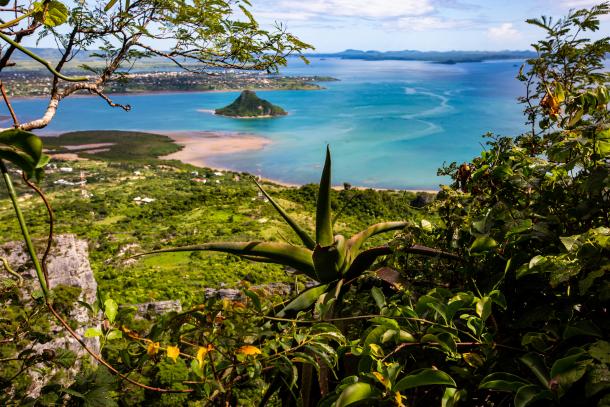The Biodiversity Conservation and Sustainable Natural Resource Management for Integrated Community Development (BIOCOM) is a flagship UNESCO initiative in Madagascar that fosters conservation-driven livelihood opportunities for local communities.
UNESCO’s BIOCOM Programme—short for Biodiversity Conservation and Sustainable Natural Resource Management for Integrated Community Development—is a flagship initiative that exemplifies the powerful link between environmental conservation and sustainable development. Designed with a focus on Madagascar, one of the world’s most biodiverse yet ecologically vulnerable countries, BIOCOM aims to align biodiversity preservation with the livelihoods and well-being of local communities.
It is launched by UNESCO, in collaboration with the Korea International Cooperation Agency (KOICA).
It was launched in 2020, implemented across Madagascar’s Montagne des Français, Marojejy, and Andohahela protected areas.
It is aimed at conserving biodiversity while enhancing socio-economic resilience among local communities vulnerable to climate change and unsustainable forest exploitation.
Objectives of the BIOCOM Programme:
- Conservation of Biodiversity: Protect Madagascar’s unique and threatened ecosystems, including endemic species and critical forest areas.
- Sustainable Natural Resource Management: Promote responsible, long-term stewardship of land, water, and forest resources.
- Community Development: Improve the socio-economic conditions of rural communities through education, employment, and empowerment.
- Youth Empowerment: Provide vocational training and life skills to young people to create alternative, sustainable livelihoods.
- Reducing Human Pressure on Ecosystems: By offering viable economic alternatives, BIOCOM helps reduce deforestation, slash-and-burn farming, and unsustainable resource extraction.
Key Features of the BIOCOM Programme:
- Sustainable Livelihood Training: Provides hands-on vocational training in fields such as masonry, metalwork, ecotourism, cooking, and basketry. These skills offer viable economic alternatives to environmentally harmful practices like slash-and-burn agriculture and illegal logging.
- Community Engagement: Promotes active local involvement in natural resource management through the creation of forest governance structures and conflict resolution mechanisms, such as “dina” community agreements, aimed at minimizing ecological damage.
- Environmental Conservation: Enhances carbon storage, protects watersheds, and improves forest connectivity to combat deforestation and biodiversity loss.
- Educational Empowerment: Fosters environmental awareness and education for sustainable development, with a strong focus on empowering women and re-engaging school dropouts.
- Climate Resilience: Encourages forest restoration and flood mitigation in erosion-prone areas by implementing nature-based solutions that strengthen ecosystems and community resilience to climate change.
Focus on Madagascar: Montagne des Français Reserve
BIOCOM’s pilot activities are being implemented in and around the Montagne des Français Reserve, located in northern Madagascar. This area is rich in biodiversity and home to numerous species found nowhere else on Earth, yet it’s also under threat from human activities like charcoal production and agricultural expansion.
Through BIOCOM, local communities—especially youth—are being trained in vocational and conservation-linked skills, such as:
- Sustainable agriculture and agroecology
- Ecotourism and environmental guiding
- Reforestation and habitat restoration
- Handicrafts and small-scale green enterprises
These initiatives are designed not only to provide employment but also to instill a sense of ownership and stewardship over the land and its resources.
BIOCOM Programme & UNESCO
BIOCOM is part of UNESCO’s broader efforts under the Man and the Biosphere (MAB) Programme, which promotes the harmonious coexistence of people and nature through the global network of biosphere reserves. It also directly contributes to the achievement of several United Nations Sustainable Development Goals (SDGs), including:
- SDG 15 – Life on Land
- SDG 13 – Climate Action
- SDG 8 – Decent Work and Economic Growth
- SDG 4 – Quality Education
- Madagascar’s biodiversity is not just a national treasure—it’s a global priority. At the same time, the country faces deep socio-economic challenges. BIOCOM represents a holistic model for how environmental sustainability can go hand-in-hand with poverty alleviation, education, and social inclusion.
- By putting communities at the center of conservation, UNESCO is helping to create resilient ecosystems and resilient people—proving that the health of our planet and the prosperity of its people are deeply interconnected.
As BIOCOM evolves, its impact goes beyond immediate environmental and economic gains. It’s laying the foundation for a new generation of local leaders who view sustainability not as an obligation, but as an opportunity. With each skill learned and each forest protected, the programme is shaping a future where development and conservation move forward—together.



